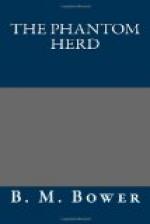"Oh, a ten dollar hoss and a forty dollar saddle, I’m goin’ to punchin’ Texas cattle."
The sub-title dissolved slowly into a scene showing a cow-puncher (who was Weary) swinging on to his rangy cow-Horse and galloping away after the chuck-wagon just disappearing in the wake of the dust-flinging remuda. Back somewhere in the dusk of the audience, a man began to hum the tune that went with the words, and the heart of Luck Lindsay gave an exultant bound. He had used lines from “The Old Chisholm Trail” and other old-time range songs for his sub-titles, to keep the range atmosphere complete, and that cracked voice humming unconsciously told how it appealed to these men of the range.
Luck did not slide down in his seat so that his head rested on the chair-back while The Phantom Herd was being shown. Instead, he sat leaning forward, with his face white and strained, and watched for weak points and for bad photography and scenes that could have been bettered.
He saw the big trail-herd go winding away across the level, with Weary riding “point” and Happy Jack bringing up the “drag,” and the others scattered along between; riding slouched in their saddles, hatbrims pulled low over eyes smarting with the dust that showed in a thin film at the head of the herd and grew thicker toward the drag, until riders and animals were seen dimly through a haze.
“My—I can just feel that dust in m’ throat!” muttered the man at his right, and coughed.
Luck saw the storm come muttering up just as the cattle were bedding down for the night. He saw the lightning, and he knew that those who watched with him were straining forward. He heard some one say involuntarily: “They’ll break and run, sure as hell!” and he knew that he had done that part of his work well.
He saw the night scenes he had taken in town. He almost forgot that all this was his work, so smoothly did the story steal across his senses and beguile him into half believing it was true and not a fabric which he had built with careful planning and much toil. He saw the round-up scenes; the day-herd, the cutting-out and the branding, the beef-herd driven to the shipping cars. True, those steers were not exactly prime beef,—he had caught the culls only, late in the season for these scenes—but they passed, with one audible comment that this was a poor season for beef!
“We rounded ’em up and we put ’em in the cars—”
The sub-title sang itself familiarly into the minds of the range men. More than one voice was heard to begin a surreptitious humming of the old tune, and to cease abruptly with the sudden self-consciousness of the singer.
But there was the story, growing insensibly out of the range work. Luck, more at ease now in his mind, studied it critically. There was the quarrel between old Dave and Andy, his son. He saw the old man out with his men, standing his shift of night-guard, stubbornly resisting the creeping years and his load of trouble; riding around the sleeping herd with his head sunk on his chest, meeting the younger guard twice on each complete circle, and yet never seeming to see him at all.




